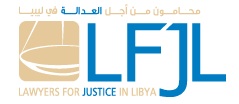By Libya Herald Reporters.

Tunis, 15 October 2015:
Libya has been lambasted for a legal system . . .[restrict]that is ambiguous in its treatment of abuses against the media and has been accused of political bias against defending the rights of journalists.
The London-based Lawyers for Justice in Libya (LFJL) has said in a new report that the state “has failed to abolish laws that directly or indirectly restrict freedom of ?expression and media freedom”.
“Other laws which are currently not actively enforced, remain on the books, risking their potential arbitrary use in the future to restrict media freedom” said LFJL in its document ’Freedom of expression in Libya: Media freedom’.
LFJL added that the right to media freedom which was ‘enshrined’ in the 2011 Constitutional Declaration had not yet been put into practice.
The group blamed Libya’s transitional policymakers for not repealing nor amending the Publications Act of 1972, which they said “provides several vague provisions that enable the illegitimate restriction of freedom of expression. Should future governments decide to suppress media freedom, these measures provide the means to do so”.
Moreover, the study holds the post-2011 governments responsible for giving in to religious entities by prohibiting “media discussion of religious opinions (fatwas)”.
The LFJL said that the media law, adopted by the National Transitional Council in 2012, is contrary to Libya’s international obligations.
Riad Alakar, a member of the LFJL study group which produced the report, called on the state to “safeguard the rights of journalists through the establishment of an appropriate legal framework in compliance with international standards and in recognition of the needs identified by stakeholders.”
He added: “The state must end impunity for attacks against freedom of expression stakeholders and institutions”.
Moreover, said the LFJL, repressive decisions by the Tripoli-based General National Congress (GNC) to impose blanket restrictions on broadcasting outlets against featuring viewpoints “hostile to the February 17 Revolution” is considered ill-founded.
“As a result, the law clearly endangers the right to express opinions freely and diminishes the accountability of state actors …discouraging those who wish to speak,” the report said.
The LFJL report is the last of three examining the state of freedom of expression and media in Libya. The previous reports looked at the issue through historical and legal perspectives.
Out of 180 countries studied in the 2015 World Press Freedom Index produced byReporters Without Borders, Libya is ranked at 154. [/restrict]







